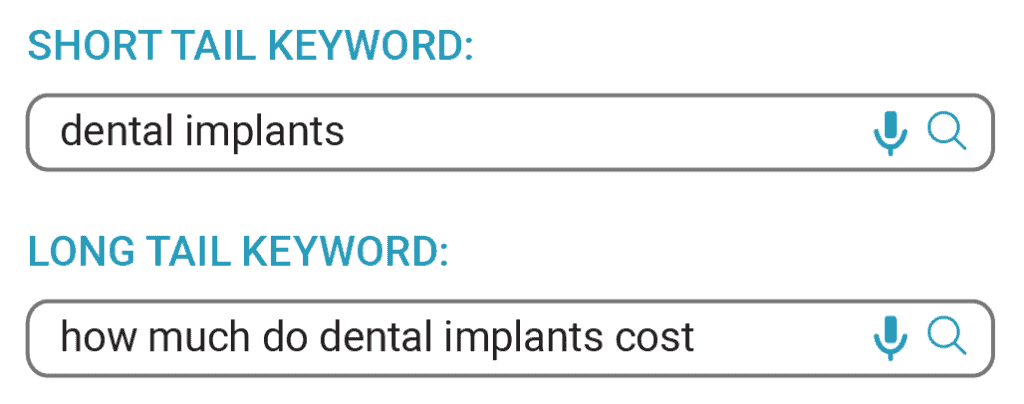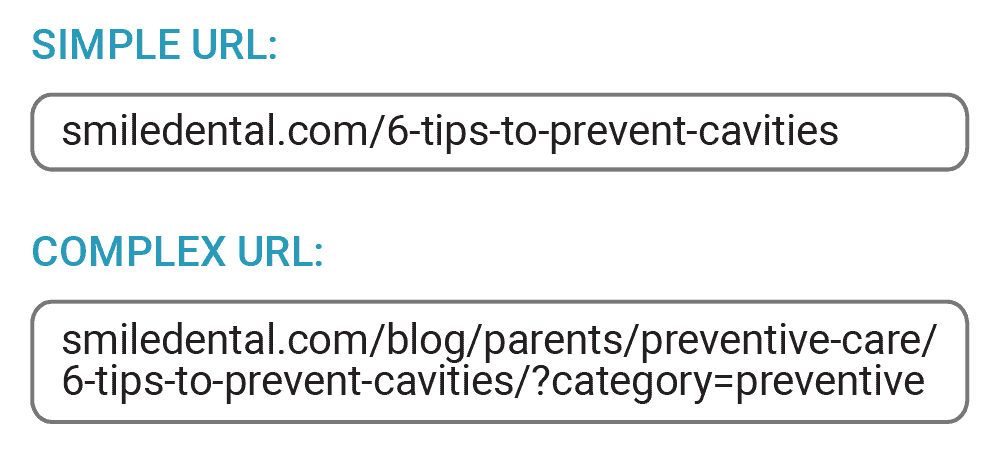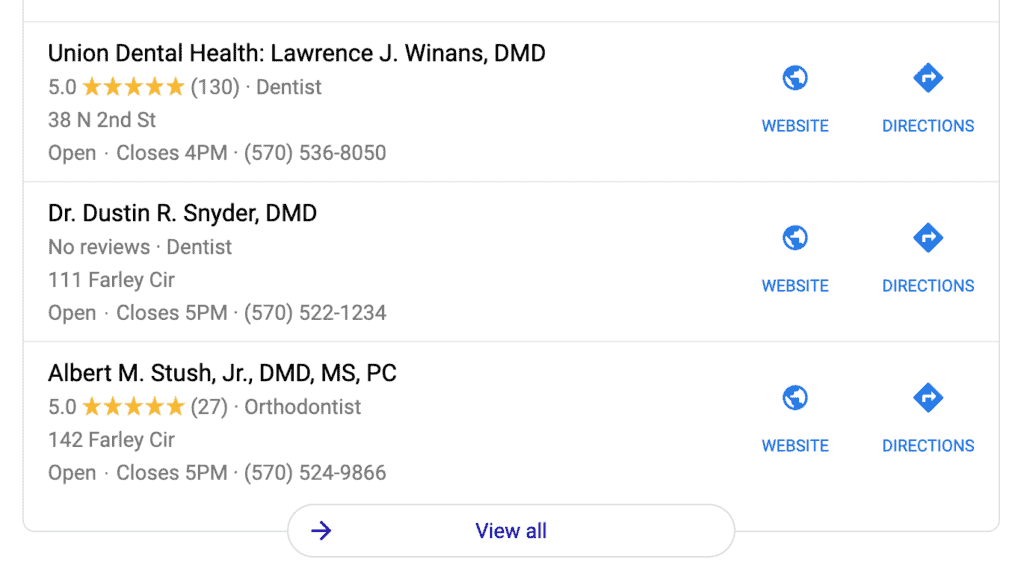What is Dental SEO and why is it important?
Not sure if dental SEO is something you should be focusing on as part of your dental marketing strategy?
Consider this… 71 percent of dental patients search online before scheduling an appointment with a new dentist.
Yes, 71 percent!
Luckily, you do have some control over how visible your dental practice is in search results, and that’s where dental search engine optimization (SEO) comes in.
But dentist SEO is a big undertaking, so where do you start and what should you focus on?
In a 2019 survey of 1,500 people who searched for dentists online, the three most important factors in their selection were (in descending order of importance):
- Online reputation (i.e., which dentist received the best reviews)
- Proximity (i.e., which dentist was closest)
- Search rank (i.e., which dentist was at the top of the search results)
All of those can be directly impacted by solid, comprehensive SEO marketing for your practice. In this guide, we’ll show you what it takes to:
- Rank higher than your competition
- Stand out in local search
- Differentiate yourself with good reviews
Note: You’ll notice that we focus on optimizing for Google. That’s because Google has a genuine monopoly on searches with more than 90% of queries going through their platform. Generally speaking, the steps you take to optimize for Google will also put you in a good position for Bing, Yahoo, and the remainder of the search engines out there.
Dig Deeper
Is Dental SEO Important for Your Practice?
You may have some doubt as to whether or not you actually need to be concerned with search engine optimization […]
Dental SEO Strategy Have a plan
Before you get started with dentist SEO marketing, you need a solid plan. At a minimum, you should consider the following:
Audience
- Who are the types of patients (or personas) you are trying to attract?
- What are their needs?
- What are they looking for?
- Which stage of the new patient journey are they in?
Competition
- How am I ranking compared to my competitors?
- What keywords are they ranking for that my site isn’t?
- What are they doing well? And not so well?
Goals
- What do you want to accomplish through SEO?
- Are you trying to attract new patients? Build your brand?
Whatever your goals are, they should follow the SMART guidelines, meaning they should be specific, measurable, attainable, realistic, and time bound.
Budget
- How much do you plan to spend to optimize and maintain your optimization and rank?
- Will you have a flexible budget that you can adjust to do whatever it takes to reach your goals? Or will you have a fixed budget that determines how high you set the bar for your results?
- Does your budget take into account the size of your market and the amount of competition you’ll face for rankings?
- Will you supplement your organic SEO with dental marketing online (Google ads and social ads)?
- Will you do any portion of the SEO in-house, or will you hire an experienced dental SEO company?
That last question (which company to hire) is perhaps the most important one for you to consider. Few dentists do SEO themselves (and even fewer do it well enough to get the results they’re looking for.) Doing it yourself can potentially save you some money, but if you don’t have the time or knowledge to do it properly, your results will be limited. To help you decide if you’ll tackle it on your own, this guide will detail some of the technical, on-page, and off-page processes that dental SEO experts follow to get real results. If you’re up for the challenge, you can dig in and start optimizing. If not, we’ll give you some quick tips to find a good dental SEO services company to help you do it right.
Dental SEO Essentials What it takes to rank higher than your competition
Technical SEO: Make it easy for Google to rank your pages
There are two distinct aspects of successful dental practice SEO: making Google happy and making users happy (which is twice as important, since Google also looks at how well you satisfied people who found you through search). First, let’s focus on the technical SEO aspects that make it easier for Google to rank your dental website properly.
Website Platform
The foundation for effective dentist SEO is a technically sound website. There are many “do-it-yourself” website builders out there that make it simple to create nice looking dental websites, but they are notorious being bad at dental website SEO, mostly due to bloated coding and slow page speeds. So, first of all, make sure your website is built on a reliable platform that allows flexibility to tweak your SEO as needed. (WordPress, which is what we use at Golden Proportions Marketing, is the most widely used solution.)
Page Load Speed
It’s hard to say who hates slow-loading web pages more — search bots or human visitors. Either way, a slow website will not rank highly. Even if you have a well-designed website, using a “cheap” hosting company may hold you back with poor download speeds (not to mention that Google will associate your site with other low-quality websites that use that kind of hosting). Google’s PageSpeed Insights tool can tell you how fast (or how slow) your website really is.
Mobile Responsive Layout
These days, the majority of users, and searches, are on mobile devices. Google has been using mobile-first indexing for its ranking algorithms for quite some time now, so if your site doesn’t have a mobile-responsive layout, you’ve already fallen behind your competition. You can check to see if your website is mobile-friendly by using Google’s PageSpeed Insights Tool.
Sitemap
Search bots need a clear path to find all of the content on your site. The best way to do that is to upload a complete sitemap (essentially, a list) of every page you want to have indexed to Google. A sitemap doesn’t necessarily guarantee that every page will be crawled, but in most cases it does help, and you’ll never be penalized for having one. The sitemap should be updated periodically or whenever new content is added.
HTTPS
HTTPS (Hypertext Transfer Protocol Secure) enabled websites encrypt data and don’t allow it to be modified or corrupted during transfer. While data security in itself is a good idea, Google also announced in 2014 that HTTPS would become one of its ranking factors. If you’re not sure if your dental website is secure, simply check the web browser address bar and see if it is preceded by “http:” or “https:”.
Dig Deeper
Dental Website SEO: the Good, the Bad, and the Ugly Things That May Be Hurting You
Dental website SEO is the art and science of what it takes to rank high in the search engines – […]
On-page SEO: Provide relevant content that new dental patients are looking for
Once your website is technically sound and ready for search engines to crawl it efficiently, it’s time to dig into the heart of SEO — creating optimized, relevant content.
Keyword Research
While this is often referred to as keyword research, in reality it is content research that you’re doing. You want to anticipate what information your audience will be searching for (and why), match that up to content you already have or can create, and then determine what keywords or phrases they will most likely use to search for that information.
Search intent
It is important to first understand the reasons why people will be searching for you, and develop a list of topics associated with each. There are four types of searches new dental patients will use to find you:
Informational intent – These users are looking for specific information. These types of searches will be more general, and harder to rank for. Examples would be queries for “tooth whitening” or “dental implants.”
Commercial intent – Your new patient prospects may be considering your office along with others, but are still doing their research. If they are looking for pricing, services offered, or reviews, then they have commercial intent. Local dentist SEO searches would also fall under this category.
Transactional intent – If someone is ready to schedule a dental appointment (whether or not it’s with your office), they have transactional intent. “Emergency dental services near me” would be an example of someone who is searching for a suitable office to contact right away.
Navigational intent – You will find that this is the most common type of search to lead people to your dental office’s website. These are people simply trying to find their way to your website (and many of them may already be patients of yours). They may just be typing your web address into their search bar by mistake, or searching for your business name if they are unsure what your web address actually is. Don’t take for granted that you will rank highly for your own name or that search results will point to your home page. Make sure that people who search specifically for you can find you easily.
Doing a content inventory
With a list of topics compiled, you need to take inventory of content you already have on your website and what you can add. Keep in mind that you probably have content already that can be repurposed in the form of brochures, blog posts, videos, and other sources, so you won’t need to create it from scratch.
Determining keywords to optimize for
Determining the right keywords comes down to finding the right balance of high search volume and low competition. Some keywords will be too competitive to organically rank for, while others will have too low of a search volume to be worthwhile. A good, middle-of-the-road approach is to try to rank highly for several longer, less competitive search phrases. These specific, “long tail” keywords will not only help you rank higher, but you’ll also be targeting a much more exact audience, giving you a better understanding of what they are looking for.
Google can actually help you come up with good long tail dental SEO keywords with its “Related searches” section at the bottom of the results page. Type in a search phrase relevant to your website and see what other common queries Google suggests.
As part of keyword planning, it’s also important to consider semantic searches. Google doesn’t limit itself to exact keyword matching. As it has evolved and become “smarter,” it has learned to recognize synonyms and closely related keywords. That means that the content you create doesn’t need to include highly repetitive usage of specific keywords or phrases. You can use words like “dentist,” “dental,” and “dentistry” interchangeably. As long as Google knows what you are talking about, it will rank your page accordingly.
Keyword Usage
Once you have your list of keywords figured out, you need to put them to good use, based on how they will be incorporated into your web pages and content.
URL
The website address (URL) for your webpage should include your primary keywords. The URL should also be as simple and short as possible so Google can clearly understand what your page is focused on. Many times, URLs get overly complicated by using too many subfolders or variable parameters, like the example below.
Title Tag and Meta Description
Although Google won’t necessarily look to see if your keywords are in your page’s title or meta description, it is a good idea to include them, since these are what people will see on the search results page. If people see the keywords included, they will be more likely to click on your result. The example below shows how the keywords searched for are actually highlighted by Google.
Header Tags
Once upon a time, it was highly important to stuff your keywords into your content’s header tags (essentially, your headline or subhead). Google does still look at those tags, but now it does so to better understand the hierarchy of a page, not just to see what the keywords supposedly are. As a general rule, if it helps your reader to see the keyword in the header, then include it. If it feels like you are overusing the keyword, then it’s probably better to leave it out or at least use synonyms and related keywords that convey the same meaning. The general rule is to use the keyword once every 300 words or so.
Keywords in Content
One important thing to remember is that you are writing for users first, and search engines second. In other words, keep your dental SEO keywords in mind, but use them naturally within your website content. Keyword density, the number of times a keyword appears relative to the total number of words on a page, is no longer a primary ranking signal for Google and, in fact, excessive keyword stuffing can result in your ranking being penalized.
Writing “naturally” for your readers will probably result in your exact keyword phrase appearing a few times, and likely within the first 100 words of your content, which will help Google recognize that your page is dedicated to that topic. You can always go back and tweak your keyword usage, but it’s best to make it part of your editing process, and not part of your writing process.
Internal Links
Internal links, or links in your content that point to other pages on your own website, are important for two reasons. First, they help Google navigate through your site and find your content. Second, the number of internal links you have pointing to a particular page indicates to Google the relative importance of that page. The anchor text for your links (the actual clickable text that your readers see) is important, since it tells Google what the link is related to. In other words, avoid using links like “Click Here.” Also avoid using the same anchor text to point to different pages, since that can send confusing information to Google.
Other Factors
Google also looks at other non-keyword signals to determine the quality of your content and how worthy it is of being ranked.
Dwell Time
The amount of time users spend on your page is a good indicator of how valuable they find the information. If users click through to your page but quickly move on, Google may assume that the content was not a good match for their search intent. You can keep readers around longer with a few dental SEO best practices.
- Provide enough content depth to provide the amount of information your audience is looking for.
- Make sure your content is neatly organized and easily scannable.
- Use video and images to capture their attention for a longer period of time.
Freshness
The more frequently you update your content and add new information, the more often Google will come back to crawl your site and rank your pages. (This is why having a blog on your website with regularly added content is a great idea.)
Duplicate Content
Content that is duplicated internally within your website is NOT something that you will be penalized for (despite some long-standing SEO myths that say otherwise). Duplicate content can, however, confuse Google as to which version of your content should be shown in search results. As a matter of good practice, use unique title tags and meta descriptions for every page on your website and try to differentiate your content as much as possible from page to page.
On the other hand, content on your website that is a duplicate of content on other websites is something you do want to avoid. This is especially common with website companies that offer the same “canned” content to multiple clients.
Accessibility
All business websites should be (and, by law, are required to be) fully accessible to all individuals regardless of any disabilities they may have. That is not only important from a user perspective, but Google also will give more weight to sites that are fully compliant with the ADA (American Disabilities Act) and WCGA (Web Content Accessibility Guidelines).
Local SEO for Dentists Stand out in local search
With your SEO optimized to allow you to rank as highly as possible, it’s time to turn your attention to local dental SEO.
Why is local SEO important for dentists?
Dentistry is a “brick and mortar” business, which means you rely on attracting people who live nearby. As we mentioned earlier, many people will, by default, choose a dentist based on proximity, which makes it even more important for you to be highly visible in local search results, or the “local pack.”
Local SEO follows the same principles as general SEO that we have already discussed. There are, however, important differences with local search results.
- They only appear only for searches with a local intent (e.g., “dentists near me” or when a person specifies a city or location).
- They deliver specific details about the location and contact information for businesses so users can easily get the information they are looking for.
Optimizing your Google My Business Page
As you might guess, your Google My Business listing is going to be a primary source of information for Google to decide if you should be one of the top local search results. That’s why optimizing your listing is extremely important.
Beyond the basics (name, address, phone, website, and hours), dentist SEO best practices say you also need to put some thought into the following sections and opportunities to tell more about your business.
“From the Business” Description
This self-written description appears near the bottom of your page, beneath your Reviews section. This is where you can add some personality and introduce yourself to searchers. To make the most of it, do the following:
- Share your most important information up front, within the first 250 characters (which are visible without clicking the “More” link.
- Use the same keywords people use to find you online.
- Content from your dental website can be used here to help people understand who you are and what makes you different from your competitors.
Business Category
Obviously, “Dentist” can be your primary business category but, depending on your specialty, you can add additional categories such as Cosmetic Dentist or Pediatric Dentist to zero in more precisely on what you do.
Services
Once you have your categories selected, you can specify services you offer, like tooth whitening or dental implants.
Attributes
Under the Info section, you can add Attributes to provide additional information about your practice and how you serve patients. Worth noting is the Health and Safety section, where you can share any infection control upgrades you’ve implemented.
Photos
Online searchers are 35% more likely to click through to your website if you include photos on your profile page. Update and add photos frequently to show Google that you’re engaged.
Questions and Answers
This isn’t done through the Google My Business dashboard, but you can go to your profile page and add your own commonly asked questions and answers (or answer real questions posted by visitors).
Google Reviews
Getting a good number of Google reviews is also important to boost your local SEO rankings. Not only do they affect whether or not you’ll make it into the local pack, but your star rating also appears within your listing, which will greatly influence whether or not people click on your link. (If you didn’t notice in our example above, the dentist ranked number one has more than 100 reviews and the dentist who got pushed out of the top spot has none. Not a coincidence!) And if you also recall from the beginning of this guide, reviews are the most important factor when people select which dentist to call from their search results.
Consistent NAPs are important
Your dental office’s NAP (name, address, and phone number) should also be consistent everywhere you post it online. Otherwise, Google will question the accuracy of the information, and your ranking could be impacted.
Reputation Management Differentiate yourself with good reviews
Your dental SEO company will probably recommend some sort of online reputation management, because reviews and online search strategies go hand in hand. Searches will lead people to your reviews, and good reviews will help boost your search results.
Post reviews on your website
Showcasing your positive reviews on your dental practice website and optimizing that page for search results is a good strategy to help guide people to your most favorable testimonials. Include as many reviews as possible and be sure to use video testimonials if you have them to increase the average amount of time visitors will stay on the page.
Generate more positive reviews outside of your website
People will also find reviews outside of your website (after all, they’re not going to believe that everybody loves you).
Make it a priority to encourage your happiest patients to post their opinions on Facebook, Google, Yelp, and other online review sites. You can’t incentivize or reward them for posting positive reviews, but feel free to provide great customer service and then ask them to share their experience online.
Dominate the first page
In addition to your website, you want any searches for your business to bring up other online resources you control, like social media sites, on the first page of search results. If you don’t fill up those spots, it’s possible for negative mentions of you and your brand to creep up into plain sight.
Find your negative feedback before patients do
You never know where a negative opinion about your dental practice might pop up, so use Google Alerts to help monitor the web for you and let you know when you need to respond to negative comments before patients see them. Just enter your business name and you’ll receive alerts whenever you’re mentioned online. Remember, even negative reviews can be an opportunity to show great customer service when you respond to them in the proper manner.
Tracking Is your SEO working?
When it comes to tracking the effectiveness of your dental SEO services, you need to track it from two perspectives: metrics that impact your SEO and metrics that result from your SEO. All of this data can be collected from Google Analytics, Google Search Console, and Google PageSpeed Insights.
The metrics impacting your dentist SEO that you want to keep an eye on are:
- Bounce rate
- Page load time
- Crawl errors
- Pages/session
- Average session duration
- Top exit pages
- Number of indexed pages
Metrics that will give you an indication of how well your dental SEO is working include:
- Number of website visits from search engines
- Conversion rate
- Keyword ranking positions
- Search query impressions
- Search query click throughs
- Sessions
Expectations
We talked earlier about setting goals for your SEO, and to make sure they are realistic. Dentists who are disappointed with SEO often have a dental SEO company who inflated their expectations about how soon or how high their website pages will rank. And, yes, there’s always the cost.
How soon will you see results?
Some SEO improvements, especially technical and on-page optimization, can produce immediate results. Other SEO issues, however, require a dental SEO expert and can take several months (even a year) to show real signs of improvement and reach the goals you had set. Also keep in mind that SEO is a moving target, and there are countless factors that can push you up or down in the rankings from day to day, week to week, or month to month.
Will all of your pages rank on the first page of Google?
Is it likely you will dominate search rankings? Probably not, but what is important is identifying the most important pages and keywords you want to rank for and focus on those. SEO is also an incremental process, so starting with small steps and ranking highly for the most important searches will give you the foundation to build a stronger and stronger search presence as you go.
How much will your dental SEO cost?
Exact costs for dental SEO will vary greatly, depending on multiple factors such as:
- Your current SEO practices
- The quality of your website
- Your goals
- The market you are in and number of competitors
- Who will be managing your dental SEO services
If you have the time, resources, knowledge, and desire, then you may be able to manage your own SEO (or at least parts of it) and keep your expense at a minimum. Most dental practices, however, make the decision to outsource their SEO needs to an experienced dental SEO company.
Dig Deeper
How Much Does Dental SEO Cost? It all Depends.
*This blog was updated on November 20, 2019. It’s a question we hear again and again – how much does […]
Finding a dental SEO expert you can trust
If you decide to hire someone to provide your dental SEO services, be sure you are carefully vetting your candidates and getting real value. Inexperienced freelancers and fly-by-night dental SEO companies will promise you big results (and maybe even produce some short-term wins), but you can be left high and dry after the contract expires. Even worse, they may use “black hat” tactics that can result in penalties against you and your website.
Golden Proportions Marketing has decades of experience providing SEO for dentists just like you, and has delivered proven SEO results for hundreds of practices. If you want to discuss your SEO needs, contact us today and we’ll help you evaluate your current SEO marketing, perform an audit of your website, define your goals, and outline a complete plan to make sure your new patients can find you online.








